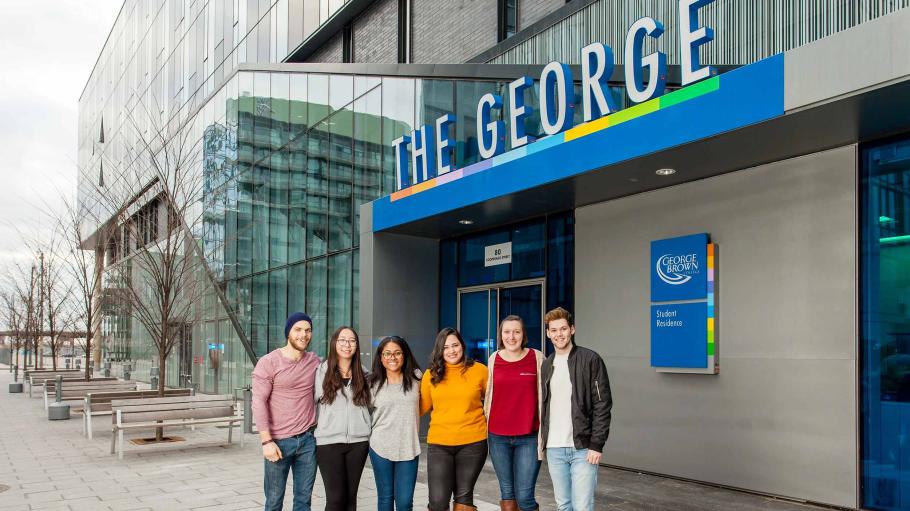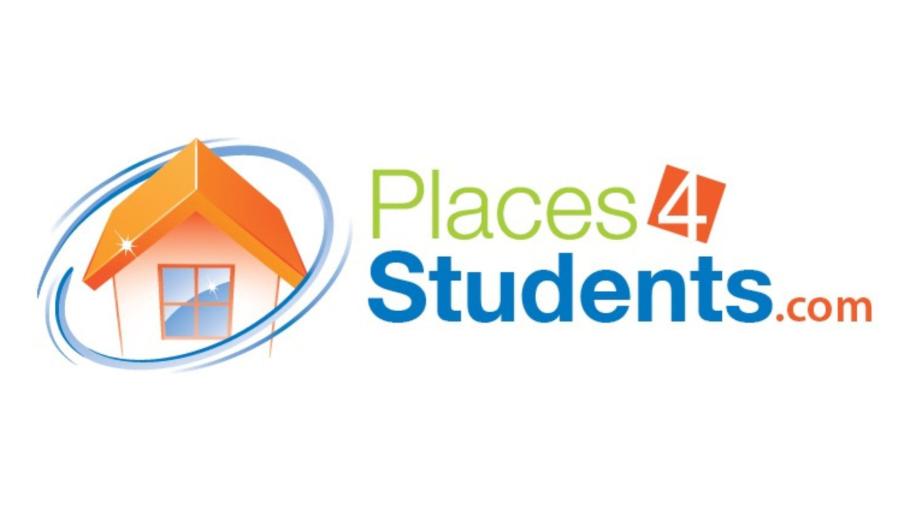There are many things to consider when searching for housing in Toronto. The Student Life and Residence Life team offer services and support for housing. On this page, we’ve compiled housing resources, links, and tips for students.
It's important to remember that as a student and resident of Toronto you have rights. Racism, sexual harassment and violence are not tolerated and the Student Success team is available to you should you need help or simply have a question about your housing arrangements.
Preparing for your housing search
What to look for

Searching for your next place to live can be very stressful. We want to help keep you organized in your hunt so we’ve compiled a fillable guide for apartment viewings and lists of information you need to keep in mind for finding your home sweet home.
Download GBC's apartment hunting guide
Types of housing
There are many types of living accommodations across the city. Most typically for students, you can lease a private room in a shared apartment or house or rent your own private apartment. There are options of furnished or unfurnished.
Most apartments usually start with a one-year contract, but it’s possible to find more short-term or sublet rentals. Rentals typically start their leases on the first or the 15th of each month.
Most apartment rental websites will show results based on number of bedrooms. Be careful to pay attention to room listings – some may appear as if they’re private apartment listings but they’re actually in a shared space, with someone renting out a room.
One other thing to make sure you’re clear on with listings and landlords is if you have a pet. Some buildings have rules against pets living on their property.
Budget
When you're looking for an apartment, it’s important to stick to a realistic monthly budget. What can you afford for rent, on top of monthly utility bills, insurance, dining and groceries, transportation, school supplies, clothing, entertainment and other expenses? If possible, it’s best to look for a monthly rent that is no more than 30-40% of your income or overall monthly budget. If you need help with paying for school, which affects your budget, please explore GBC's financial aid options.
Pay close attention to apartment listings regarding utility bills and laundry. Some places include some utilities in the rent, others don’t and would be considered extra costs. If an apartment doesn’t have laundry, you may need to go to a laundromat.
Rental costs in Toronto are at an all-time high, creating a lack of affordable housing. Living in a shared space helps to bring down your monthly cost of living, as well as looking outside of the downtown core.
There are plenty of articles written about apartment-hunting budgeting tips – this is a crucial step to do your research with, so you don’t find yourself in a tricky situation later!
Location
Apartments are generally the most expensive in the downtown core and close to subway stops. If you expand your search, you are likely to find cheaper rent. Of course, you’ll want to be somewhere that’s easily accessible by transit to get downtown for classes, so keep that in mind while you’re looking. How long would your commute be? Are there multiple ways to get to and from your home, in case one route is impacted by delays? Would you have to take the TTC or GO Transit?
Most apartment listing websites let you search and filter via a map, so you can compare costs and work from there.
Necessities
When you’re looking for housing, it’s important to determine your needs list vs. your wants list. What do you need in a home to live there? Does it need to be close to the subway or can you take a bus to the subway? Do you need laundry in the unit or building, or can you live with going to a laundromat? Do you need a bathtub or are you okay with just a shower? Do utilities need to be part of the rent or can you budget them separately? Do you need windows facing a certain direction for optimal sunlight? Do you need an elevator or any other accessible features? Establishing these lists will help you choose where to look and live with more ease.
Know your rights

If something feels fishy to you, trust your instincts. Unfortunately, scammers can take advantage of students who don't know their rights or customary rental practices in Ontario. So, it’s important to look out for yourself when apartment hunting and do your research.
Places4Students keeps a list of fraud and scam alerts for students along with tips to avoid them, and liv has a list of the most common scams in Canada.
Do's and Don'ts
Here are some quick do's and don'ts:
- Do ensure you or a trusted family member, friend or agent view the property ahead of signing a lease agreement.
- Do demand a written lease, be aware of too-good-to-be-true rates and meet the landlord in person if you can. Make sure to research listings, landlords and property management companies.
- Do know your rights – you do not have to answer personal questions about how long you’ve lived in Canada, your age, ethnicity, religion, gender, sexual orientation, marital status, family status or disability.
- Don't wire money to another country, give out personal financial information, give out your Social Insurance Number, deal in cash or pay more than the first and last months’ worth of rent.
City and provincial rights
It’s very important to know your rights as a tenant! You have the right to equal treatment without discrimination and harassment.
Check out some examples from the Advocacy Centre for Tenants Ontario, the City of Toronto website and the Ontario provincial website and brochure.
Also, make note of Ontario’s Residential Tenancies Act (RTA) and the Landlord Tenant Board in case you’ll need help down the road. Please note the RTA does not cover student residences such as The George.
Safety
It’s important to ensure you know safety measures and that your home has the proper equipment in case of emergency. Here are some informational links from the City of Toronto:
- RentSafeTO for Tenants
- Home, School & Workplace Safety
- Safety Equipment & Devices
- Learn How to Prevent, Identify & Treat Bed Bugs
- Public Safety & Alerts
- Understand & Fight Evictions
- Mutl-Tenant Rooming Houses
- Renter Rights in Multi-Tenant (Rooming) Houses
Here are some safety resources from GBC:
Student legal services
Do you need legal advice? We know lawyers are expensive – especially on a student budget – but we also know that they can be a necessary expense.
GBC’s Student Association provides legal assistance to students with respect to a broad range of legal issues. If you’re looking for help, please contact legal@sagbc.ca. Consultations are generally conducted over email, however virtual or in-person appointments can be arranged when necessary.
Tips
Make sure to go over your lease (also known as tenancy agreements or rental agreements) very carefully! Here is a list of terms that can and cannot be included in agreements.
Landlords of most private residential rentals must use this Ontario standard lease. For more information, check out this guide to the lease (which includes in other languages).
Where to look for housing
George Brown College students are provided this information on available housing resources so that each student can choose to research and decide on the accommodation options they are interested in pursuing further during their time at the College. The College is not endorsing any particular property on its site and therefore is not directly or indirectly responsible for damage, loss or liability arising from a student's participation.
Please note that the housing platforms/homeshare providers are third-party housing services that are independent from George Brown College. George Brown College has no responsibility or liability for, or control over, your use of these third-party housing services and cannot guarantee that housing obtained through these third-party housing services will be safe or secure. If you have any questions about the third-party housing services, please contact the housing platform or homeshare provider directly.
On campus: The George

George Brown College has an on-campus student residence, The George, that features all-inclusive living, with the flexibility of eight-month (fall/winter) and four-month (summer) agreements.
The George houses over 500 students in fully furnished two-bedroom suites that include a kitchenette and three-piece bathroom. The rooms also have Wi-Fi, flat-screen TVs with cable, a phone with local calling, and floor-to-ceiling windows.
The common spaces feature a patio, barbecue, large game rooms, relaxation areas and study spaces overlooking the city.
Off campus: Places4Students

George Brown College has a partnership with Places4Students, a site specifically designed for students looking for housing. Students can browse property listings, roommate profiles, sublets, message boards and more for free. They also offer customer service and support with the understanding of students’ needs.
Places4Students features listings for a variety of housing types, with clear filters to help your search.
More off campus options

Toronto has many popular websites for rental listings. Please note that the college has not vetted these accommodations.
Homestay
Student Homestay Services maintains a close network of caring families that have housing available to international students. For international student assistance, please contact Eloise Poon.
Emergency and short-term housing services
Here are a few emergency homeless or housing resources within Toronto. If you are a student experiencing emergency housing struggles, you can also contact letstalk@georgebrown.ca to make an appointment with a caseworker for support.
- City of Toronto Central Intake – A central referral service for people who are homeless or at risk. They’ll direct you to shelters or 24-hour respite sites across the city based on their criteria.
- Contact: Call 311, 416-338-4766 or GTA toll free number 1-877-338-3398
- Eva’s Place – An emergency shelter for homeless youth aged 16 to 24. You must call ahead and have photo ID to enter.
- Location: 360 Lesmill Road
- Contact: via Central Intake, 416-338-4766
- For emergency shelter with mental health/substance use support, call Eva’s Satellite 416-229-1874
- Horizons for Youth – A shelter for at-risk and homeless youth aged 16 to 24. You will need to call ahead to check availability. Two pieces of photo ID are required.
- Location: 422 Gilbert Avenue
- Contact: 416-781-9898 or info@horizonsforyouth.org
- Covenant House – A shelter for youth in crisis and homeless youth, aged 16 to 24. They include a drop-in centre and health clinic (with open hours)
- Location: 20 Gerrard St. E.
- Contact: 416-593-4849 or toll free 1-800-435-7308
- YWCA Toronto – YWCA Toronto operates two free shelters for women, transgender or non-binary people over the age of 16 who are experiencing homelessness or violence. YWCA staff speak a variety of languages.
- 1st Stop Woodlawn Shelter
- Location: 80 Woodlawn Ave. E.
- Contact: 416-923-8454 or 416-922-3271
- Davenport Shelter
- Pet-friendly
- Location: 348 Davenport Road
- Contact: 416-922-1001
- YWCA Arise Shelter
- Emergency shelter from violence
- Contact: 416-929-3316 or arise@ywcatoronto.org
- YWCA Women’s Shelter
- Contact: 416-693-7342
- 1st Stop Woodlawn Shelter
Student Housing Working Group
In 2023, George Brown College created a Student Housing Working Group to contribute to tackling the affordable housing crisis. Follow along with our research, deep dives into community needs and advocacy at https://www.georgebrown.ca/student-housing-working-group.
Questions about housing on and off campus:
Email housinginfo@georgebrown.ca or call 416-415-5000 extension 2048.
Check out these additional resources:
- Residence Life
- Email info@georgebrownresidence.ca or call (416) 761-8000
- Financial Assistance for Students
- Email FinAid@georgebrown.ca or call (416) 415-2000
- International Student Services
- Email intlsupport@georgebrown.ca or submit an Inquiry Form.
